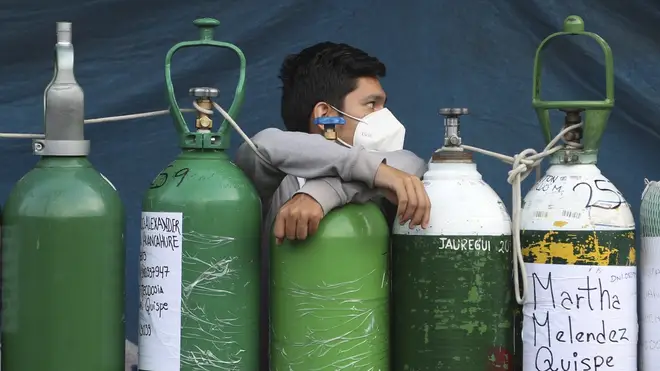
Shelagh Fogarty 1pm - 4pm
25 February 2021, 12:54

A global task force focusing on oxygen has been formally announced.
A crisis over the supply of medical oxygen for coronavirus patients has struck nations in Africa and Latin America.
Warnings in the regions went unheeded at the start of the pandemic and doctors say the shortage has led to unnecessary deaths.
It takes about 12 weeks to install a hospital oxygen plant and even less time to convert industrial oxygen manufacturing systems into a medical-grade network. But in Brazil and Nigeria, as well as in less populous nations, decisions to fully address inadequate supplies only started being made last month, after hospitals were overwhelmed and patients started to die.
The gap in medical oxygen availability “is one of the defining health equity issues, I think, of our age,” said Peter Piot, director of the London School of Hygiene & Tropical Medicine, who said he survived a severe coronavirus infection thanks to the oxygen he received.

Doctors in Nigeria anxiously monitor traffic as oxygen deliveries move through the gridlocked streets of Lagos. Desperate families of patients around the world sometimes turn to the black market.
In Brazil’s Amazonas state, a pair of swindlers were caught reselling fire extinguishers painted to look like medical oxygen tanks. In Peru, people camped out in lines to get cylinders for sick relatives.
Only after the lack of oxygen was blamed for the deaths of four people at an Egyptian hospital in January and six people at one in Pakistan in December did governments address the problems.
John Nkengasong, director of the Africa Centres for Disease Control and Prevention, said medical oxygen is a “huge critical need” across the continent of 1.3 billion people and is a main reason that Covid-19 patients are more likely to die there during surges.

Even before the pandemic, sub-Saharan Africa’s 2,600 oxygen concentrators and 69 functioning oxygen plants met less than half the need, leading to preventable deaths, especially from pneumonia, said Dr John Adabie Appiah, of the World Health Organisation.
The number of concentrators has grown to about 6,000, mostly from international donations, but the oxygen produced is not pure enough for the critically ill. The number of plants that can generate higher concentrations is now at 119.
Yet without formal requests from governments, nearly 20 billion US dollars in World Bank coronavirus funds for the world’s poorest countries has been left unspent, the organisation told The Associated Press.
Nigeria was “struggling to find oxygen to manage cases” in January, said Chikwe Ihekweazu, head of its Centre for Disease Control.

A main hospital in Lagos, a city of 14.3 million, saw its January virus cases increase fivefold, with 75 medical workers infected in the first six weeks of 2021. Only then did President Muhammadu Buhari funds to set up 38 more oxygen plants and cash to repair plants at five hospitals.
Some oxygen suppliers have dramatically raised prices, according to a doctor at the Lagos University Teaching Hospital. That has driven up the cost of a cylinder by 10 times to more than the average monthly wage, and a critically ill patient could need up to four cylinders a day.
Leith Greenslade, co-ordinator of the Every Breath Counts Coalition, which advocates for wider access to medical oxygen, said the looming shortages were apparent last spring.
“Very little was done. Now you have a second wave, not just in Africa but in Latin America and Asia, and the oxygen shortages are becoming at crisis levels,” she said.
A global task force focusing on oxygen was formally announced on Thursday and will include the World Health Organisation and World Bank, among others.